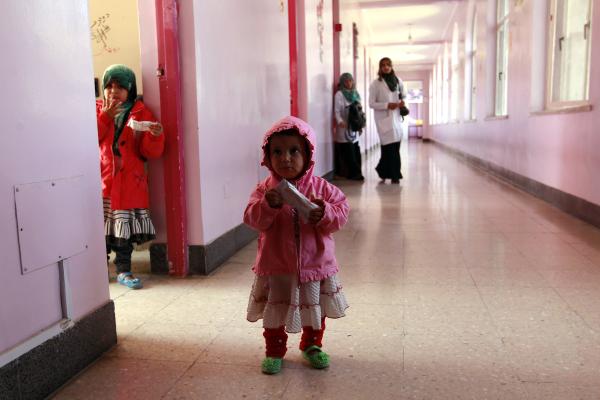
Yemeni malnourished children stand at a therapeutic feeding centre in the capital Sanaa on January 2, 2016. According to the UN children’s agency UNICEF, more than half a million children are facing life-threatening severe malnutrition in wartorn Yemen. AFP PHOTO / MOHAMMED HUWAIS
Hundreds of thousands of children in Yemen are bearing the brunt of the year-old war that has been tearing the Arab world’s poorest country, Yemen. The spread of hunger has been the most horrific consequence of Yemen’s war with score of Yemeni children face life-threatening malnutrition and millions lack access to health care or clean water, the U.N. Children’s Fund said on Tuesday.
The impoverished nation of 26 million people, which imports 90 percent of its food, already had one of the highest malnutrition rates in the world, but in the past year the statistics have leaped.
A UNICEF report also said that the war had “exponentially increased” the dragooning of child soldiers, with 848 documented cases – including boys as young as 10 – forced to fight.
The situation has started to relatively enhance as the Saudi-led coalition and Yemeni rebels, known as Houthis, have agreed to a cease-fire at midnight on April 10 ahead of peace talks starting April 18 in Kuwait.
“We’re hoping that the truce kicks in on the 10th and will allow parents and families to come and access health services and other services,” Julien Harneis, UNICEF’s Representative in Yemen, told Reuters by telephone from Sana’a.
“In Sa’ada in the last week, there has definitely been a reduction of fighting in the border area. In Sana’a, we have seen fewer (Saudi-led) air strikes,” he said.
“On average, at least six children have been killed or injured every day,” said the report “Childhood on the Brink”. UNICEF has confirmed 934 children directly killed and 1,356 injured, but says they are “only a tip of the iceberg”.
“Basic services and infrastructure in Yemen are on the verge of total collapse,” it said, noting attacks on schools, hospitals and the water and sanitation system.
Nearly half of Yemen’s 22 provinces on the verge of famine and over 13 million people need food aid, the U.N.’s World Food Programme said last week.
UNICEF delivers nutritional supplies and vaccines against measles, polio and other childhood diseases in the country of 24 million, but it is not enough, Harneis said.
“We’ve got an increase in both severe acute malnutrition and chronic malnutrition,” he said.
The report said an estimated 320,000 children risk severe acute malnutrition, which can leave a child vulnerable to deadly respiratory infections, pneumonia and water-borne diseases.
Nearly 10 million children require humanitarian aid to prevent a further deterioration. Chronic malnutrition can stunt growth and development.
“UNICEF estimates that nearly 10,000 children under 5 years may have died in the past year from preventable diseases,” it said, citing lower vaccination rates and declines in treatment.
Hospitals and clinics in Yemen have suffered shortages of medicines, leaving millions living in areas that have virtually no medical care. The Saudi-led coalition has allowed humanitarian flights bringing medical supplies in addition to food and water in to Sanaa as well as shipments into Hodeida port, the closest one to the capital.
